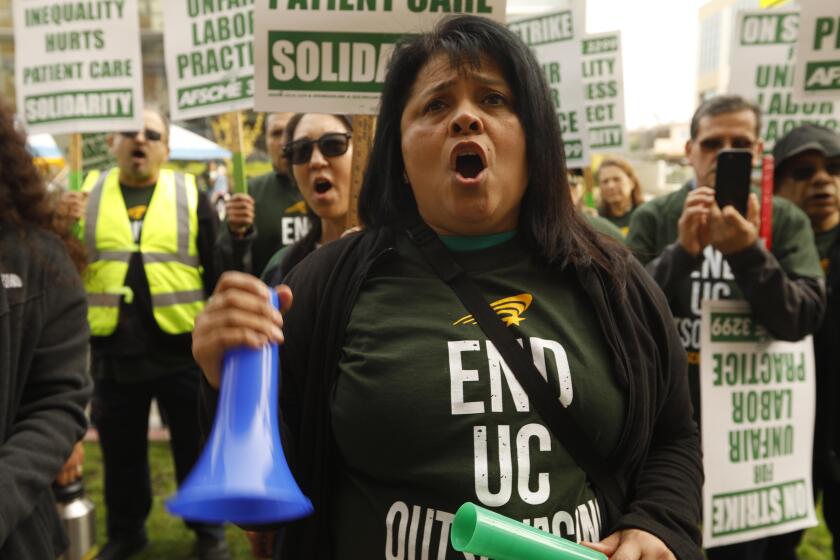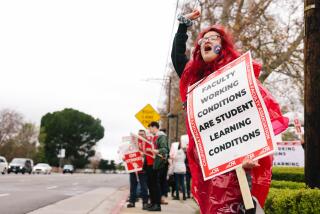UC professors fail to report outside income, shortchanging the university system

For nearly two decades, Dr. Neal Hermanowicz has led the movement disorders program at UC Irvine, where he earns more than $380,000 a year in salary and bonuses. The widely respected expert on Parkinson’s and Huntington’s diseases adds to his income by consulting for drug companies.
Since 2014, 11 pharmaceutical companies have paid him a total of at least $588,000 in consulting and speaking fees and honorariums, according to federal data. For example, he has received more than $225,000 in speaking and consulting fees from San Diego-based Acadia Pharmaceuticals, manufacturer of a controversial drug for Parkinson’s-related psychosis. In 2017, he was the company’s highest-paid physician consultant in the U.S. That year, he prescribed the drug more than 180 times, costing patients or their insurers more than $445,000.
Under University of California rules aimed at discouraging excessive moonlighting, Hermanowicz should have reported his outside income to UC Irvine. He also should have turned over more than $200,000 of it to the school from 2016 to 2018, according to UC Irvine policies. His academic department would then have decided how much to keep and how much to return to him.
But that didn’t happen, because Hermanowicz did not report to UC Irvine any payments from pharmaceutical companies from 2014 to 2018, according to internal campus documents.
Through an assistant, Hermanowicz declined to comment, citing a busy schedule. He did not respond to emailed questions.
Hermanowicz’s actions are not uncommon. A review of almost 90 UC system health faculty members, who had among the highest outside incomes at four medical schools, found that about two-thirds, including Hermanowicz, did not report all of the money as required.
“People who get in there, and are trying to make money on the side: Why bother being a professor?” said Stanton Glantz, a UC San Francisco professor who researches the tobacco industry, sits on the conflict-of-interest committee for his campus and doesn’t do any paid outside consulting with pharmaceutical companies. “If people are breaking the rules, they should be disciplined.”
The analysis was conducted by ProPublica, an independent, nonprofit newsroom for investigative reporting. The news organization compared UC-required “outside professional activity” disclosure forms with a federal database, Open Payments, which collects information from pharmaceutical and medical device companies on their payments to doctors. The information gathered by the UC system and the federal government isn’t identical, but ProPublica took the differences into account. For example, it filtered reimbursements for travel, hotels and entertainment out of the Open Payments data because the UC system doesn’t regard such reimbursements as salary.
ProPublica examined the UC records as part of an effort to build a national database of faculty outside income called Dollars for Profs.Through public records requests, the news organization collected more than 29,000 records for professors and staff at about 20 universities as well as more than 8,000 records for academic researchers funded by the National Institutes of Health.
The examination found that the lack of candor within the UC system among many health sciences professors could be shortchanging the university — and, ultimately, California taxpayers. That’s because, alone among public universities nationwide whose policies were reviewed by ProPublica, the UC system requires most of its 4,000-plus health sciences faculty members to turn over to it any earnings above an annual cap of $40,000 or 40% of their base pay, whichever is higher.
UC is at war with its biggest labor union. University employees fear they will be displaced by lower-paid temp workers
The extent of the university’s slice varies from one department to the next at medical schools. The department retains a fraction of the money above the threshold and returns the rest to the professor as bonus compensation or to support conferences and other academic activities. For example, the department of medicine at UC San Francisco keeps up to 20% of income over the threshold.
For at least two years at UC Irvine, Hermanowicz’s department chair didn’t sign off on his disclosure forms, as the university requires. His most recent disclosure form was approved by the interim chair of the neurology department, Dr. Tahseen Mozaffar.
Mozaffar has also failed to fully disclose his own outside activity and consulting income to the university. According to the comparison of federal data and UC records, Mozaffar underreported his earnings by around $100,000 between 2014 and 2018, and didn’t disclose his ties to at least four biotech companies.
Mozaffar declined to answer specific questions about the underreporting but said “there is some lack of clarity on what needs to be reported.” He didn’t elaborate on what was unclear.
In addition, the Open Payments federal database is “not a perfect system,” he said.
John Murray, a spokesman for the UC Irvine Medical Center, said medical school officials are aware and concerned that “transparency hasn’t fully permeated the culture of academic medicine…. More work needs to be done to ensure uniformity in this area.”
According to a 2017 UC Irvine audit, the dean’s office takes 5% of the money that professors return to the campus. The school has at least 20 health sciences departments, each of which has its own policy and may take as little as 5% or as much as 40%. The audit of 38 of the campus’ 800-plus full-time health faculty members found that its school of medicine had lost $114,000 in revenue in one year because of underreporting by 11 professors. Based on the audit’s findings, underreporting may cost the university system millions of dollars a year.
The case of Hermanowicz, who was among the top 20 professors in outside income of those reviewed by ProPublica, illustrates this impact.
His 2016-17 base salary from the university was about $175,000, less than his roughly $180,000 in outside income during that year. Under university policy, he should have turned over at least $110,000, which is the amount of his outside income that exceeded 40% of his base salary, to his campus.
In the 2017-18 academic year, when his outside income was about $173,000 and his base salary was about $191,000, he should have shared at least $96,000. Depending on the neurology department’s policy, the dean and the department together should have kept as much as $49,000 in 2016-17, and as much as $43,000 in 2017-18, and given the rest back to Hermanowicz.
Potential conflicts of interest
In recent years, the internal UC Irvine audit and another at UC San Francisco have found that, of a sample of health science faculty members, about one-fourth weren’t disclosing all of their outside income.
ProPublica’s investigation and the audits show that campus administrators fail to monitor or enforce the rules adequately and rarely penalize violators — a testament, critics say, to the power of tenured faculty and the university’s desire to accommodate pharma companies that fund academic research. The underreporting at the UC campuses contrasts with the increase in researchers’ disclosures of potential conflicts in academic journals.
The failure to report outside income may conceal conflicts of interest affecting the objectivity of teaching and research. Under UC Irvine guidelines, for example, outside consulting should be “as separate from the research as possible” to avoid conflicts. If a conflict interferes with academic duties, or the professor fails to report outside work, the university can intervene by limiting consulting or, in egregious cases, terminating employment.
Hermanowicz has been a leading advocate for Acadia’s drug, pimavanserin. Approved in 2016, the drug, better known by its trade name Nuplazid, has been associated with more than 2,000 patient deaths and 10,000 other adverse events, according to Food and Drug Administration data — figures that one expert has called an “important warning signal.”
Besides serving as an investigator in its clinical trials, Hermanowicz has also published several studies that tout Nuplazid’s safety and efficacy while acknowledging his financial ties to the company. Nuplazid “got some attention in CNN recently with maybe an increasing risk of death, which I don’t think is valid,” he told doctors and patients gathered in a hospital conference room in Burbank last year. “They didn’t really do a careful analysis. They just said people took this medication and then they died.”
Last year, an FDA analysis found no “new or unexpected” safety risks related to Nuplazid, which remains on the market.
Acadia has maintained that the drug is safe for patients and that the multitude of adverse events reflects its patient population, which is mostly elderly and in an advanced stage of Parkinson’s disease.
“Our top priority is patient safety, and we stand by the established efficacy and safety of Nuplazid,” said Maurissa Messier, a senior director for corporate communications at Acadia. Acadia is now seeking approval for Nuplazid to treat the millions of people who suffer from dementia-related psychosis, such as Alzheimer’s disease.
A push to improve reporting
Five UC medical schools — those at San Francisco, Davis, Irvine, Los Angeles and San Diego — account for the majority of the university system’s health sciences faculty, and each maintains its own system for monitoring conflicts of interest and commitment, which occurs when outside activities pull a professor away from academic duties. Until this year, most campuses collected disclosures of outside employment with paper forms.
The university is rolling out a major initiative across campuses, known as the Outside Activity Tracking System, to improve reporting of outside activities and address potential conflicts, spokesman Stett Holbrook said in an email. It also plans in 2020 to “institute more formalized and focused auditing of disclosures,” Holbrook said. The new system makes reporting easier by employing a “simple, interactive format,” and it provides faculty with training and education on disclosure policies, he said.
The university “cannot offer an explanation” for discrepancies in reporting by specific faculty members “without investigating the facts,” and each campus does its own monitoring, Holbrook said. “There are always opportunities for improvement,” he said.
The dean’s office at UC Irvine’s medical school, the home of its health sciences faculty, didn’t have a process to track, monitor and reconcile outside earnings of its faculty, campus auditors found in 2017. UC Irvine spokesman John Murray said the campus is responding to the audit’s recommendations by adopting the tracking system.
The lack of disclosure extends beyond the Irvine campus.
At UCLA, Dr. Richard Finn, a clinical professor of hematology and oncology, reported outside income of exactly $40,000 during the 2016-17 academic year. Federal records show that he earned at least $99,000 from pharmaceutical companies that year. Finn did not respond to phone messages and emailed questions about his industry ties.
That same year, at UC San Francisco, Dr. Shane Burch, an associate professor of orthopedic surgery, reported $19,556 in outside earnings, whereas federal records show he earned $160,000 from medical device makers for consulting, teaching and speaking during that time.
Burch, who acknowledged that he owed money to the university from his outside consulting, said the university’s policies have been unclear and poorly explained.
“The University of California might have put it in the fine print, but none of us understood it,” Burch said. “The university says go and do the outside activities, there is a lot of good that comes out of it. And, at the same time, the policies by which they enforce it have been really vague.”
Some professors didn’t report certain payments at all.
For example, Dr. Philip Bickler, a professor of anesthesia at UC San Francisco, told the university that he made $37,000 from law firms as a medical legal consultant during the 2017-18 academic year. He didn’t disclose that he also received an additional $32,000 consulting for Purdue Pharma, which makes the drug OxyContin and has been criticized for contributing to the opioid epidemic. During the 2017-18 academic year, Bickler helped Purdue Pharma try to develop less dangerous pain medications, he told ProPublica.
“If we can make pain meds safer, it’s probably a good thing for society — that’s how I justified it,” Bickler said. He called his lack of disclosure an oversight and said he was not familiar with the university’s $40,000 threshold on outside income.
“Sometimes the regulations aren’t as clear as they should be,” he said, adding that he plans to submit a revised disclosure to the university.
The UC San Francisco audit in late 2016 found that one professor was serving on a speaker’s bureau for a pharmaceutical company and that five were receiving side income from the private sponsors of their clinical trials — both violations of university rules. Auditors warned that such indiscretions could create “reputation risks” for the university.
Lisa Bero, former chairwoman of UC San Francisco’s conflict-of-interest committee, said the panel “was always troubled by incomplete information” due to the lack of centralized reporting. The reports were mostly used by departments to determine whether faculty members were spending too much time working outside the university, rather than to identify potential conflicts of interest or the underreporting of income.
“A universal, comprehensive conflict-of-interest disclosure and central review, at least for all research, is needed,” she said.
Annie Waldman is an education reporter at ProPublica. Her sister is a member of the medical faculty at UC Davis.
More to Read
Start your day right
Sign up for Essential California for news, features and recommendations from the L.A. Times and beyond in your inbox six days a week.
You may occasionally receive promotional content from the Los Angeles Times.







